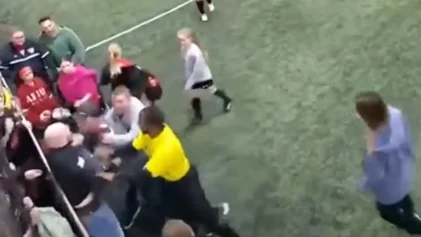A Black man was convicted of murder in the 2014 shooting death of a police officer in a case that raises legal questions about no-knock warrants and the right to self-defense while also highlighting racial disparities in the justice system after a white defendant faced no charges in the killing of a sheriff’s deputy the year before under similar circumstances.
Marvin Guy, who was jailed nearly a decade ago in connection with the murder of detective Charles Dinwiddle, was found guilty on Nov. 21 after continuing to claim he mistook the officer for an intruder during a May 2014 drug raid in which a SWAT team smashed his bedroom window, prompting him to open fire.
The jury, however, did not convict Guy of the more serious charge of capital murder, underscoring a lack of unanimity among the jurors regarding Guy’s awareness that he was shooting at officers at the time of the incident.

His sentencing is scheduled for next week, but he will be spared the death penalty after prosecutors set aside the consideration for capital punishment in an effort to expedite the aging criminal case.
The raid that ensnared Guy stemmed from a no-knock warrant obtained by police based on a tip that alleged Guy’s involvement in cocaine deals, which legally permitted two dozen officers to forcibly enter Guy’s apartment on May 9, 2014.
Due to the warrant, the unit was not required to announce who they were as they tried to breach Guy’s door with a battering ram—however, an obstruction inside prevented officers from immediately gaining entry.
Moments later, one of the deputies accidentally detonated a stun grenade, sparking a boom that awoke Guy in the middle of the night, culminating in a feverish exchange of gunfire.
Living in a high-crime area and hearing no warning from the police outside his door, Guy said he immediately assumed criminals were trying to break into his home after a home invasion just a week before in his neighborhood, in which an intruder crawled through the first-floor window of a woman before assaulting her.
Guy claimed the nearby crime made him anxious and led him to open fire on the officers, striking four of them while killing Dinwiddle.
In response, police fired a barrage of 40 rounds toward Guy.
During the trial, prosecutors argued that Guy knew police were planning to raid his home and that he lay in wait to “ambush” them.
Guy’s defense attorney, Jon Evans, maintained that he had the right to defend his home as he likely felt afraid for his life.
“One man’s ambush is another man panicked, being scared his home is being broken into,” Evans said.
Following the operation, authorities claimed to have found traces of suspected drugs throughout Guy’s apartment and belongings, although no drug charges were ever filed against him.
Under Texas law, the Castle Doctrine allows individuals to stand their ground in their homes when facing a perceived deadly threat. However, this protection under the law is greatly diminished if the defendant is engaged in illegal activities, as Guy was.
A crucial aspect of Guy’s defense pointed to various other fatal episodes involving the pre-dawn raids, which typically take the homeowner by surprise while in a state of sleep fog.
Once Guy realized it was the police, he said he immediately dropped his weapon and complied with the officers’ commands.
In a remarkably similar case, a Central Texas grand jury opted not to indict Henry Goedrich Magee in February 2014 after he fatally shot Burleson County deputy Sgt. Adam Sowders, who was 31.
The deadly shooting happened Dec. 19, 2013, as officers, armed with a no-knock warrant alleging guns and drugs, entered Magee’s rural home about 90 miles northwest of Houston.
During the proceedings, Magee’s attorney, Dick DeGuerin, used the same argument to defend Magee as Guy’s attorney would later argue in his trial, saying his client thought his home was being burglarized and was in fear for his life when he grabbed his gun and opened fire.
He described Sowders’ death as a tragic accident, and the grand jury agreed, indicting Magee for third-degree felony marijuana possession while in possession of a firearm.
“This was a terrible tragedy that a deputy sheriff was killed, but Hank Magee believed that he and his pregnant girlfriend were being robbed,” DeGuerin said at the time, adding, “He did what a lot of people would have done. He defended himself and his girlfriend and his home.”
Guy’s case also echoes the botched sting in which Louisville Police officers opened fire and killed Breonna Taylor in her apartment more than three years ago in a similar no-knock drug raid.
At the time, Taylor and her boyfriend, Kenneth Walker, were in bed when they were awakened by banging at the door from what Walker said he believed then were intruders attempting to force their way inside, leading him to fire one shot that ignited a barrage of gunfire from police.
Charges against Walker were later dismissed after prosecutors determined he made a legal attempt to defend the home.


